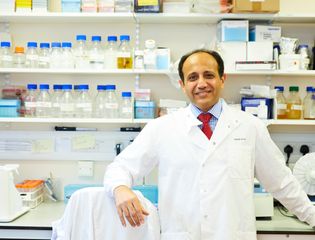How can we get OvarianVax to clinical trials?
In 2024, years of discovery work led by Professor Ahmed at the University of Oxford took an extraordinary leap forward. His team uncovered that immune cells in the fallopian tubes (where many ovarian cancers begin) can “remember” cancer cells. Even more remarkably, they discovered that these immune cells can be trained to recognise and destroy cancer cells before they've ever appeared.
Early results are extremely promising. The first stage of the project, funded by Cancer Research UK, is already underway, testing and refining the “instruction manual” in lab models. But in order to avoid delays, Ovarian Cancer Action is preparing to fund the next phase of work at the same time to help speed up the process of getting the vaccine to clinical trials.
What is a clinical trial?
A clinical trial is a research study that tests new ways to prevent, detect, treat, or manage diseases. This can include:
- New drugs or combinations of drugs
- Medical devices
- Lifestyle or behavioural changes
- Screening or diagnostic tools
- Surgical techniques
Clinical trials are vital to the discovery of new treatments, screening tools, and cures. Every major breakthrough in medicine has been made possible thanks to people taking part in research.
Whether it’s developing a new cancer drug or improving early diagnosis, clinical trials help researchers understand what works, for whom, and why.
Each trial follows strict safety and ethical standards and must be approved by independent review boards
Why are clinical trials important?
Clinical trials are the only way we can make progress in medicine. They:
- Provide evidence on what works and what doesn’t
- Help improve outcomes for future patients
- Sometimes give participants access to cutting-edge treatments
- Ensure new treatments are safe and effective before they become widely available
Without volunteers, research simply can’t move forward.
What to expect: timeline of a clinical trial
Clinical trials are conducted in phases, each designed to answer key questions:
Phase 1: Is it safe? (Small group, early testing)
Phase 2: Does it work? (Focused group, effectiveness testing)
Phase 3: Is it better than current options? (Large-scale comparison)
Phase 4: How does it work in the long term? (Post-approval monitoring)
OvarianVax is currently preparing to move from preclinical work to Phase 1, which means first-in-human trials could begin in the next few years, provided the development stages stay on track.
Who could the OvarianVax clinical trials help?
If successful, OvarianVax could enter clinical trials in the next five years.
Initial trials will prioritise women at high genetic risk, especially those carrying a BRCA gene mutation.
Around 1 in 200 people carry a BRCA mutation, and in the Ashkenazi Jewish community, it’s as high as 1 in 40. Globally, this represents 10 million women who are currently forced to make life-altering decisions, including preventative surgery that affects fertility and triggers early menopause.
A safe, effective vaccine would offer a transformative alternative - one that could protect future generations and drastically reduce ovarian cancer rates over the next 30 years.


